1/32 Trumpeter P-47C-2 Thunderbolt
Trumpeter's P-47D razorback modified to a P-47C-2 (mostly involved getting the lower two cowling flaps removed and replaced as cowling), done as my friend Steve Pisanos' airplane circa late July/early August 1943. (Thanks to Mike Grant for doing the 1/32 decals) I had the problem that the kit has the deepened keel that came with the plumbing for drop tanks, though they didn't appear at the earliest until early August and I wanted to do the earlier insignia. Then Steve told me that the 4th FG was slow in changing the national insignia to the white bar/red surround style officially adopted July 1 '43. So here it is with the early-style insignia and the later drop tank. I have a photo of Steve sitting on a motorcycle in front of the airplane and you can see this insignia and a drop tank, so it works historically.
Walter Cronkite, who covered 8th AF for UPI during World War II once said "of all the people I met during the Second World War, the most outstanding was Steve Pisanos." It's not hard to see why: he arrived in 1940 as an "illegal immigrant" who didn't speak English, taught himself the language reading newspapers with a Greek-English dictionary, learned to fly, went to Canada and joined the RAF, became a member of 71 Eagle Squadron. When the Eagles became the 4th FG, his immigration status was discovered, and he ended up being the first immigrant to take advantage of the new law that an immigrant who joined the US forces could get immediate citizenship. Became an ace, got shot down, fought with the French Resistance for six months, participated in the liberation of Paris. I could go on, but you won't be disappointed if you buy his autobiography, "The Flying Greek." He was the last ace of the 4th Fighter Group left, still sharper than a tack, and one of the best people you could ever meet. Sadly he "flew west" in May 2016 after a life very well lived. As he said "My life is the American Dream," and so it was.
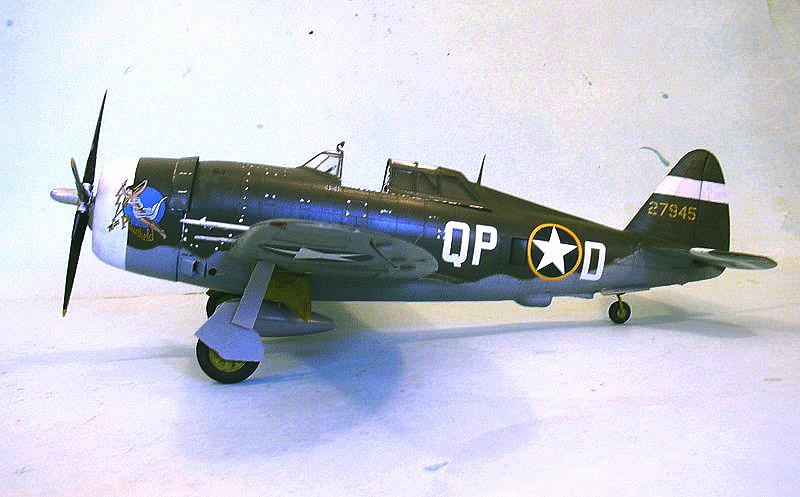
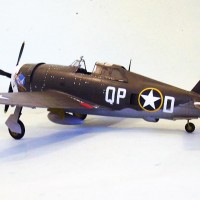
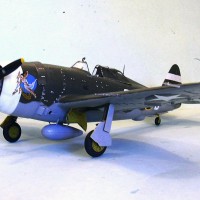
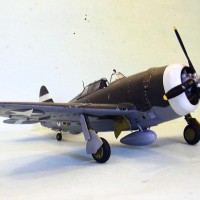
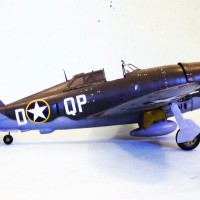
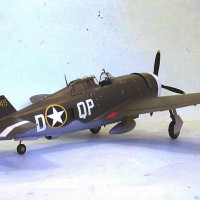
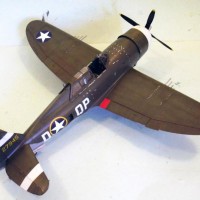
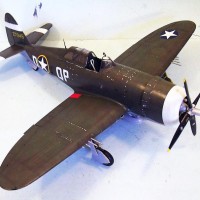
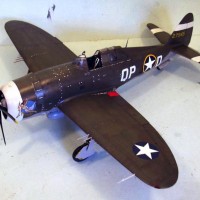
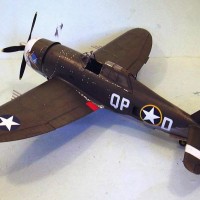
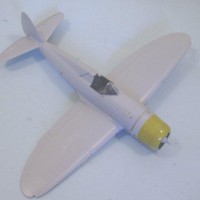
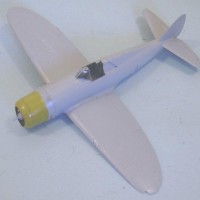
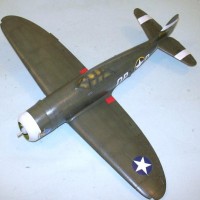
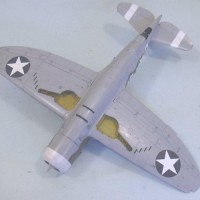
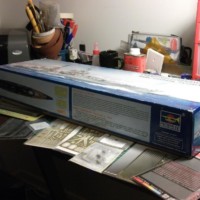
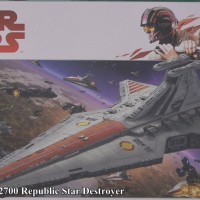
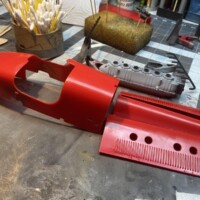
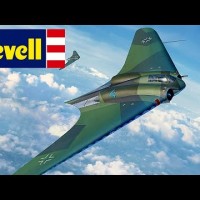
Tom: This is a great tribute to Steve Pisanos; his story is terrific, and your model of his aircraft is excellent. Thanks for sharing both.
Merry Christmas!
Excellent story and build. My niggle here has nothing to do with the modeler...Trumpeter didn't bother to model the brakes. You see the inner wheels covers and the exterior wheels have spokes. Looking at a Tamiya Razor Back will prove my point. You see the new Revell Uhu He-219 going for 58.00-64.00 dollars U.S. and the He-111 going for similar price and knowing the price for what your painting for this kit ...makes me scratch my head. This kit needs resin replacement wheels ... apologizes to all for play "Scrooge" and saying "Bah Hum Bug". Trumpeter needs to do a better job on researching their kits. Its always hit or miss with them.
Yeah, but from three feet away through a pane of glass at the front of the case, all the many non-modelers who see it at Planes of Fame think it's pretty cool.
But you are right about Trumpeter's track record.
Awesome Jug, Tom. Nice commitment to detail getting Mike Grant to create 'Miss Plainfield' with the light blue background. Did you build it with all of Trumpeter's crazy piping and duct work on the inside? While eyeballing the kit in my stash, I've often wondered whether it's truly necessary to include all that.
Your certainly correct about Steve Pisanos- of the 8th AF veterans I've met over the years he is definitely among their finest gentlemen. An amazing life story too, definitely worthy of a biopic and the studio wouldn't have to embellish a single exploit to make it larger than life.
Interestingly, both the light blue background and the red background to "Miss Plainfield" is right. There were two of them: The P-47C-2 you see here, and a P-47D-5 (with the full-size cowl flaps all the way around), which he had the squadron painter do in red because it seemed more visible and thus identifiable to others in the air. Everybody's been arguing about the colors, without taking a minute to count the cowl flaps. If you look at the photos in Chris Bucholtz's Osprey book on the 4th, you'll see two photos of the nose; if you count the flaps you'll see you're looking at two different airplanes.
Being a member of the "If you can't see it I didn't do it!" club, no I did not put all that plumbing in (ditto on the P-38). You definitely do not need it and will not miss it.
As to the movie, I actually tried. But intelligent ideas have a way of running into brick walls out here in Okeefenokee West.
Thanks for clearing that up, Tom. I must admit that I never investigated further- often when such "arguments" develop on other forums I just tune out. I'm glad to know that the kit can be built without all of the guts that no one would ever see anyway.
Hey Tom, what a great build. I have a few Trumpeter kits in the 'to do' pile and I know they're pretty complicated builds so this is a cracking result. I don't know where you guys get the time/energy to turn out some many stunning models!
Joe Baugher's seminal website lists the serial #'s for the C, D models, and the number you used is for the D-1-RE block that he flew. (http://joebaugher.com/usaf_fighters/p47_3.html) I was wondering why there is so much confusion and 2 a/c explains it... now all we need is to find out the Charlie's serial number and it will be sorted. Beautiful job, nonetheless, and keeping the research flowing. Regards, Robert